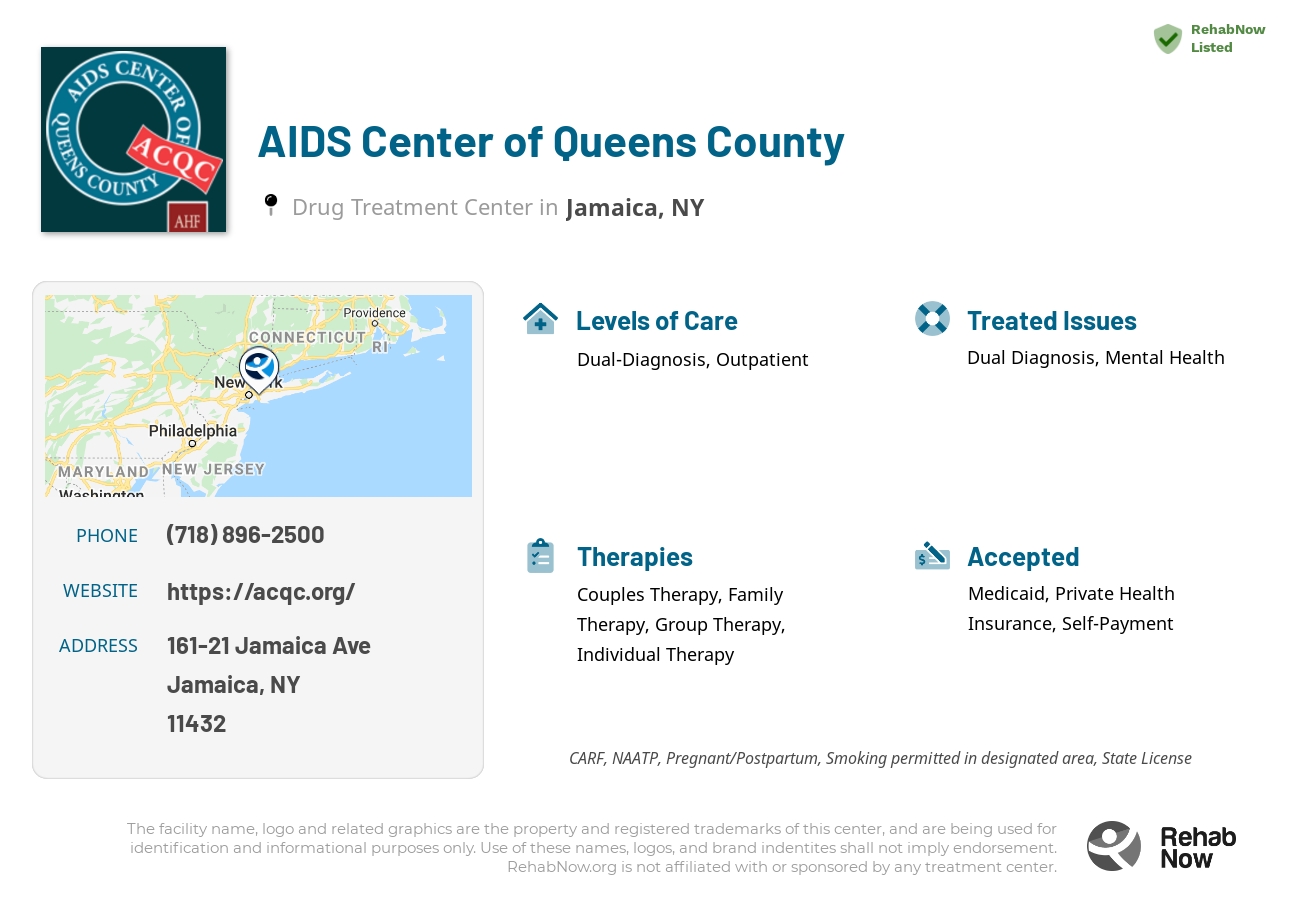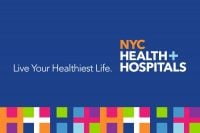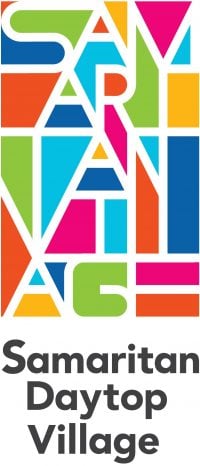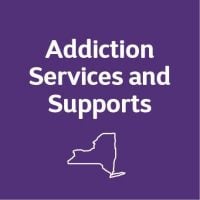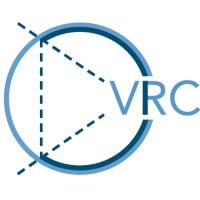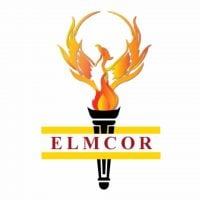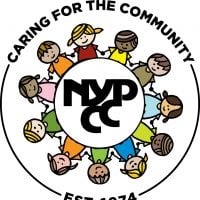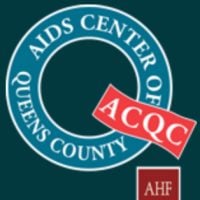
AIDS Center of Queens County
Drug Rehab Center in Jamaica, New York
- Mental Health
- Dual Diagnosis
The AIDS Center of Queens County in Jamaica, New York, is a comprehensive Addiction Treatment Facility that offers dual diagnosis and mental health services, personalized treatment plans, and case management services to individuals with private health insurance in order to provide effective and affordable care.
About This New York Facility
The AIDS Center of Queens County in Jamaica, New York, is a comprehensive Addiction Treatment Facility dedicated to providing individuals suffering from dual diagnosis the highest quality of care. It offers a full range of services, including dual-diagnosis, outpatient, and residential levels of care. They accept patients with private health insurance, and strive to ensure all their consistent care is both effective and affordable. The facility is also equipped to treat any mental health needs, allowing those suffering from both addiction and mental illness access to the highest level of therapeutic services.
AIDS Center of Queens County is an accredited and licensed treatment facility, and places great emphasis on providing personalized treatment plans tailored to the needs of each patient. Services include psychotherapy, individual and group counseling, family/peer groups, and medication management and administration. In addition, the facility provides case management services to ensure the patient is not only receiving the most effective treatment, but that their overall health needs are being met. With their patient-centered approach to care, the AIDS Center of Queens County is strongly committed to providing individuals with the resources and support necessary for a successful recovery.
Genders
Ages
Modality
Additional
Conditions and Issues Treated
An underlying cause often brings about addiction. Mental disorders can lie at the center, such as schizophrenia, bipolar disorder or anxiety disorder. As well as the cause of the addiction, a dual diagnosis by AIDS Center of Queens County helps to treat the addiction. This ensures that after treatment is complete, the patient will not fall back on old practices.
Levels of Care Offered at AIDS Center of Queens County
This center offers a variety of custom treatment tailored to individual recovery. Currently available are Dual-Diagnosis, Outpatient, Residential, with additional therapies available as listed below.
Outpatient treatment is treatment that occurs when a patient is not checked into a rehab facility. The patient may show up for therapy sessions, go through detox and engage in other therapies to help them recover. However, they will do so while they live at home in New York.
Outpatient therapy provided by AIDS Center of Queens County is usually recommended as a follow up to inpatient therapy. It helps patients adapt to their normal lives after treatment. In some cases, it can also be an alternative to inpatient treatment. People may choose this route if they are unable to leave their jobs, children or if they don’t have the money for inpatient treatment. However, inpatient treatment is the best way to recover from addiction.
Residential treatment programs are those that offer housing and meals in addition to substance abuse treatment. Rehab facilities that offer residential treatment allow patients to focus solely on recovery, in an environment totally separate from their lives. Some rehab centers specialize in short-term residential treatment (a few days to a week or two), while others solely provide treatment on a long-term basis (several weeks to months). Some offer both, and tailor treatment to the patient’s individual requirements.
Therapies & Programs
Individual professional counseling or individual therapy refers to the one-on-one interaction between a patient and his or her counselor. Individual therapy allows for more privacy, one that group interactions can’t provide. Therefore, it becomes easier for a person to unload and become more open to his or her counselor.
Another benefit of individual therapy at AIDS Center of Queens County in Jamaica, NY is that all sessions aim to speed up a single person’s progress. It makes it easier for the counselor and the patient to deal with the central issues, which are likely the culprits of substance addiction.
Once the roots of the problems are addressed, it becomes less challenging for a recovering patient to maintain sobriety and brush off temptations.
Families are not always as supportive as they could be, but by opting for family therapy, many recovering addicts are able to understand their addiction and get the support they need to get sober. These therapy sessions at AIDS Center of Queens County in Jamaica, NY involve all members of the family who play a role in the recovering person’s daily life. They work together to overcome past issues, avoid triggers, and remain strong and supportive of each other.
In group therapy, the patient undergoes sessions with other patients dealing with similar problems under the guidance of a trained counselor. The members of the group interact with each other and talk freely about their issues. The recovery of members of the group from the problems that they face gives the patients confidence that they can also overcome their addiction.
Group therapy at AIDS Center of Queens County reduces the feeling of loneliness and improves the coping skills of the patients. Group therapy provides patients with continuous feedback from other members. The group dynamics ensure that members start having some structure and routine in their lives.
Cognitive behavioral therapy (CBT) is a way of addressing concerns through talking. Talking through issues can identify sources of discomfort or unhealthy thoughts. CBT is a healthy way AIDS Center of Queens County addresses some behaviors which may be bringing unintended consequences in a persons life.
Payment Options Accepted
For specific insurance or payment methods please contact us.
Is your insurance accepted?
Ask an expert, call (888) 674-0062
Additional Details
Specifics, location, and helpful extra information.
Jamaica, New York 11432 Phone Number(718) 896-2500 Meta DetailsUpdated November 25, 2023
Staff Verified
Patient Reviews
There are no reviews yet. Be the first one to write one.
Jamaica, New York Addiction Information
More than 2 million New Yorkers are currently suffering from some type of substance abuse and many of those are minors. Alcohol abuse, in particular, is prevalent among those underage. As a result of the high prices and regulation of prescription drugs, many New Yorkers turn to heroin instead. This has led to a serious heroin epidemic in the state.
About 1.5% of adults in Jamaica, New York, reported using illicit drugs. The drug overdose death rate increased to 19.6 deaths per 100,000 residents in Jamaica, New York in 2016. Marijuana is the most commonly abused drug in the area. The highest rate of drug abuse is found among young adults. Common drug rehab centers in Jamaica include inpatient rehab facilities, outpatient rehab programs, and residential treatment programs.
Treatment in Nearby Cities
- Smithtown, NY (33.0 mi.)
- Hampton Bays, NY (68.0 mi.)
- Spring Valley, NY (31.0 mi.)
- Eden, NY (295.8 mi.)
- Sunnyside, NY (6.9 mi.)
Centers near AIDS Center of Queens County

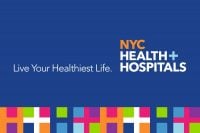

The facility name, logo and brand are the property and registered trademarks of AIDS Center of Queens County, and are being used for identification and informational purposes only. Use of these names, logos and brands shall not imply endorsement. RehabNow.org is not affiliated with or sponsored by AIDS Center of Queens County.

